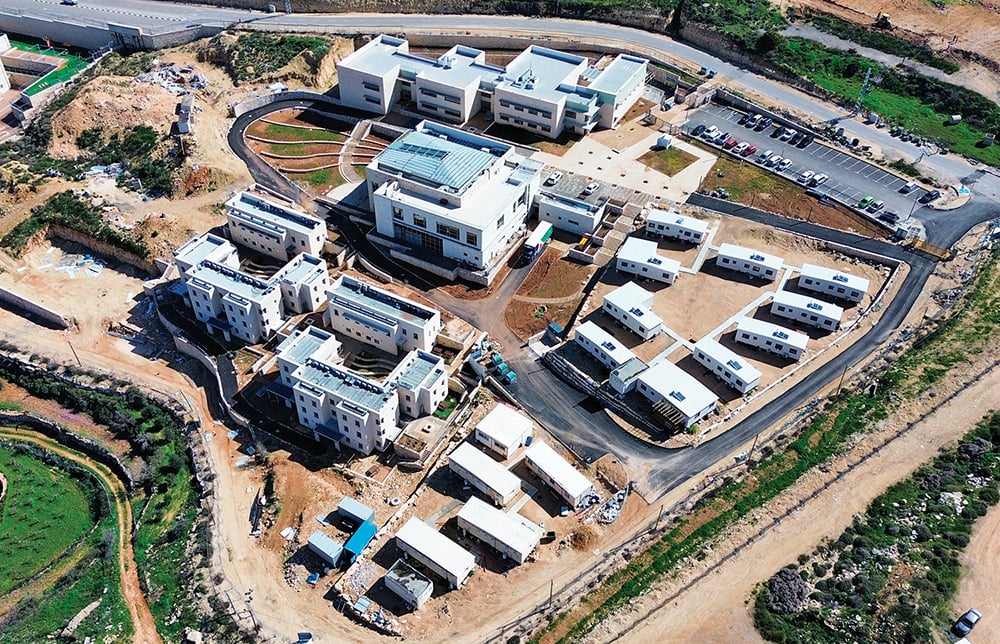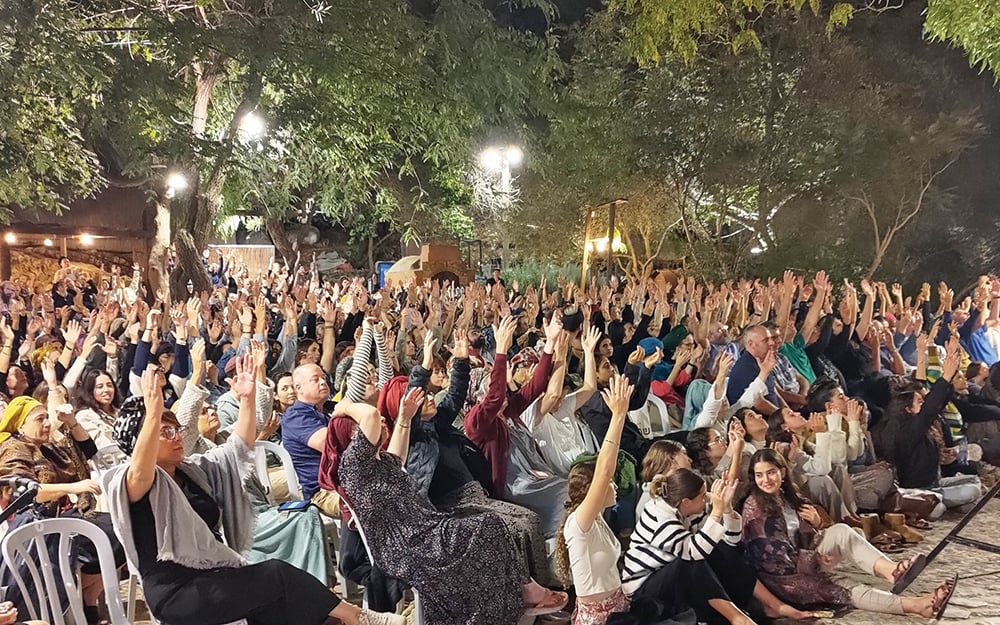
“And the King of the South will conspire with the King of the North to attack the residents of the land; and the Ammonites and Moabites the dwellers of the plains will harass Israel; and the expulsion of the followers of Eliyahu from the Jericho valley; and the expulsion of the followers of Elisha who were exiled from the Town of Dekalim by their own brothers from the house of Israel, 200,000 men; and the tribulations of every generation.”
Before Moshe leaves this world, Hashem gives him a tour of the Land he cannot enter and the Targum Yonatan ben Uziel (Devarim 34:3) quoted above, translates this tour into a peek at future coming attractions. We are literally living in “biblical” times. Someone recently posted that after thousands of years, it seems time to add another, new book to the biblical canon. The truth is that there is no need to write another book. We need to understand that we are living in “biblical” times because all that is happening has literally already been written!
Can it be a coincidence that the passage referred to in Targum Yonatan is read on the day of Simchat Torah?
Can it be a coincidence that it predicts an alliance between the leaders of the South and the North to attack Israel?
Can it be a coincidence that it mentions the expulsion of Jews by fellow Jews?
Can it be a coincidence that the two places where Jews were expelled were Jericho and the town of Dekalim (Neve Dekalim was the capital of modern Jewish Gaza).
Can it be a coincidence that the Oslo plan was originally called “Jericho and Gaza First”?
These predictions by Yonatan ben Uziel, the greatest of Hillel’s students, were called out by a voice from Heaven saying: “Who dare reveal my secrets to mankind?” Yonatan stood up and said: “It is I who revealed your secrets to mankind, may it be apparent and clear to You, I did not do this not for my own honor, nor for the honor of my father’s house, but rather in Your honor, to minimize quarrels in Israel.” (Bavli, Megilla 3a)
Can the arguments end; is Jewish unity possible? It was only 10 years ago, when things were different, when the entire Jewish world experienced an unprecedented sense of unity in the aftermath of the kidnapping and murder of Naftali, Gil-Ad and Ayal by Hamas terrorists in the summer of 2014. Yeshivat Makor Chaim, then located in Kfar Etzion, became the hub of military, political, communal and spiritual activism during the search for the missing boys. Visiting Israeli leaders and the families of the boys said that the tremendous feeling of unity was, in great part, due to Rabbi Dov Singer and Makor Chaim’s leadership and inspiration. Personally, as a result of that experience, I chose to join Makor Chaim where Naftali and Gil-Ad had studied and to take part in the construction of a new campus in their memory, now located in Neve Daniel.

Unfortunately, that feeling of unity slowly faded away, until after the election of the present government, when we found our country torn apart by internal strife. The violent demonstrations against reform of the legal system, the desecration of last year’s mass Yom Kippur prayer service at Dizengoff Square, the rabid demonstrations outside of the prime minister’s home—all combined to weaken us in the eyes of our enemies. Whether one chooses to look at the situation as divine retribution or as a practical geopolitical result of our internal divisions— it is clear that this, in some way, led to the October 7 attack on our country.
The sometimes violent demonstrations, now ostensibly in the name of the hostages, are just another form of fighting the government in the name of what is called in Israel “the Conceptzia”—the misguided assumption that our all our enemies want is land, freedom and security and are not the latest virulent manifestation of antisemitism, the historic bane of mankind. The present war is the final burial ground of that philosophy. We read in Daniel 14:11, “And in those days many will confront the King of the South, and the irresponsible members of your nation, Daniel, will rise up with the pretense of presenting a vision, an ideal based on their own aspirations—and will fail.”
These specific events, among many others predicted in our sources, are just a part of a predicted process of redemption, stage by stage. We tend to think of repentance, teshuva, as a personal, not a national process, but the recently read portion of Nitzavim, which deals with teshuva, tells quite a different story. Read Devarim, Chapter 30, carefully. The predictions of a spiritual renaissance are intermingled with the stages of a structured physical renaissance of the Jewish nation. Here are the stages: ingathering of the exiles (passages 3,4), settlement of the land (passage 5), military power (passage 7) and economic power (passage 9). All of these are happening before our very eyes, as is a new wave of religious rebirth and fervor. Never before in history has there been a war accompanied by so many millions of Jews around the world united in their prayers and yearnings for peace—not to mention the endless prayer, dancing and Torah study of the soldiers on the front line.
The Abarbanel (Yeshuot Meshicho, Iyun 1:3) asks the following question. How is it that the Talmud doesn’t castigate the opinion of Rabbi Hillel that “there is no Messiah for Israel, for they already devoured him (used up their rights for Messiah) in the time of Chizkia” (Sanhedrin 99a). He answers that Rabbi Hillel believed redemption would be a process of many stages, but it would not necessarily be centered on a specific person. (The Vilna Gaon says something similar regarding the process of Mashiach ben Yosef). The Abarbanel goes on to list the stages, with the four mentioned above (aliya, settlement, military prowess, economic power), followed by an unprecedented stage of Torah study, followed by the return of prophecy. While the previous stages have largely taken place, we are just beginning to feel the first signs of prophetic yearnings with the onset of what is loosely termed “Neo-Hasidism.” More and more people are searching for not just the intellectual knowledge of Torah, but for a direct, intimate, emotional connection with the divine.
The first step on the path of connecting with the Unknowable is to know and love His creations, especially our fellow Jews. “Then those who fear God conversed with each other, and God listened in and heard” (Malachi 3:16). When we pray, we can’t be certain that God pays attention to our prayers, but the prophet Malachi tells us that when two Jews have a heart-to-heart conversation, God comes down to be there. In order to know and love God, we need to first learn how to speak with each other. This idea, by the way, is the core of Makor Chaim’s programs—our adult spiritual development outreach program, the “Beit Midrash L’Hitchadshut”; “Lifnai V’Lifnim Olami,” our educators’ development program in Israel and in close to 20 schools in the U.S., Canada, Australia and the U.K.; in addition to the educational philosophy of our yeshiva high school.
Just like a mother who loves to see all her children and grandchildren together, so too, God takes pride in Jewish unity and love and considers it a prerequisite to full redemption. In Zecharia 8:19 we are told that if our fast days are to turn into holidays, we must love both truth and peace, which often seem to contradict each other. This is our dilemma in every facet of Israeli life. How can we charge ahead with truths we know to be right, while seeking to bind the wounds of society with love and forgiveness?
In addition to striving for Jewish unity, we have many additional resources in meeting our present challenges. On the defensive side, we know “Torah protects and rescues” (Sotah 21). Regarding offense, Targum Onkelos, in Bereshit 48:22, departs from his usual mode of simple translation and explains that Yaakov Avinu defeated the Amorites “B’Charbi U’B’kashti, with his sword and bow,” translated in a play on words as, “with my prayer and entreaty.”
Moreover, we need to know that God put us in this world to be his partners, to take action and not to rely on miracles. Consider this apparently false blessing many of us say daily, the blessing on bread: “Blessed are You … who draws out bread from the earth.” One can understand blessings like “creates the fruit of the tree, fruit of the earth,” but bread from the earth? Anyone who has studied the series of Shabbat prohibitions knows that it is man who plants the seeds, harvests the grain, grinds and sifts the flour, kneads the dough, lights the fire and bakes the bread! How can we say God does this? The answer is simple—we need to know that we are God’s fingers!
We can’t expect Him to do all the work while we just push His buttons by prayer and Torah study. If we understand the many passages of Malchuyot on Rosh Hashanah, we know that it is our job to coronate Hashem’s rule upon this world. Throughout the High Holidays, as well as on every Sunday morning, we quote King David in Tehillim 24: “Who is the King of Honor? Hashem is the hero in war!” When did we have a tremendous sense of demonstrating God’s rule over the world? When we courageously succeed, almost miraculously, in war! This was our feeling during the Six-Day War and once again during the majestic, miraculous events of recent weeks—the surgical beeper attacks followed by the strike against Nasrallah and 400 of his top terrorist commanders, the second failed Iranian missile attack, our attacks on Iran and more.
What is the takeaway from the events of the past year— from the raging antisemitism abroad and the war on Israel’s borders? The Jews in Israel must know that the lesson is “Land for Peace,” but not in the usual sense. On Rosh Hashanah we read (Tehillim 47:4-5): “He destroys nations under us and states under our feet. He chooses our domain.” Is the aggression of our enemies a sign as to where we need to liberate our land? Is it just a coincidence that southern Syria was emptied of millions of inhabitants just a few years ago; that Gaza and Southern Lebanon are now being emptied as well? How many times will we be forced to take back these areas until we finally get it?
While Jewish unity is a necessity, we in Israel must understand, we will never have peace until we rule over all of our ancient homeland. As for our fellow Jews still in exile—get the hint. It’s time to come home.
Yossi Baumol, Makor Chaim’s director of development, is available for speaking engagements and can be contacted at [email protected]












